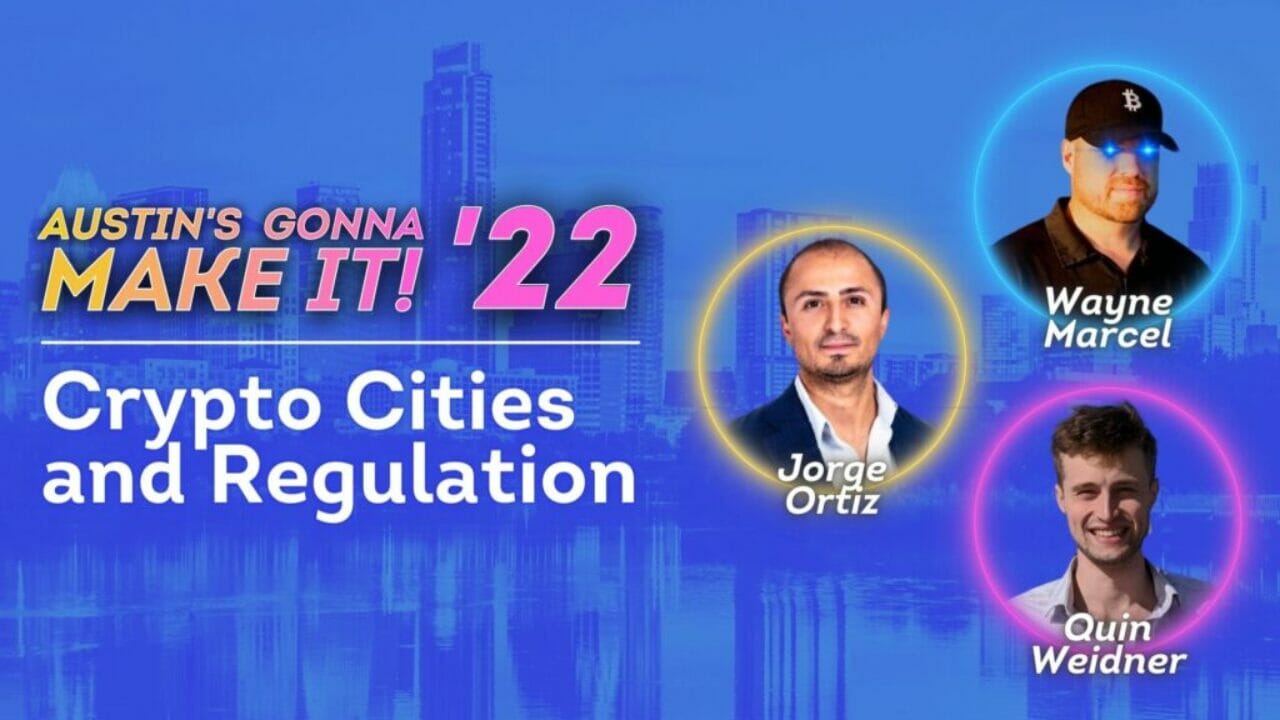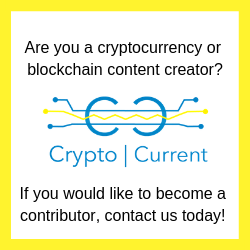Predicting the Evolution of Crypto Cities & Regulation with Jorge Ortiz, Quin Weidner and Wayne Marcel at AGMI 2022 (Episode 327)
Predicting the Evolution of Crypto Cities & Regulation with Jorge Ortiz, Quin Weidner and Wayne Marcel at AGMI 2022
This panel includes:
MODERATOR: Wayne Marcel – Head of Biz Dev at FIO Protocol
SPEAKER: Jorge Ortiz – CEO of Powder Keg Collective
SPEAKER: Quin Weidner – President of Node Providers
Want more resources around this podcast? Keep up to date on the latest articles here.
The following transcript was created using artificial intelligence. There will be some grammatical errors below.
00:00:00:01 – 00:00:12:27
Wayne Marcel: And I feel protocol. We have a usability layer that’s making crypto easier to use no matter which cryptocurrency people are trying to use. And I’m going to turn it over to Jorge and Coin introduce himself. Jorge, I want you to go ahead. Go first.
00:00:12:29 – 00:00:45:10
Jorge Ortiz: Yeah, sure. So thank you for having us, Richard. This is awesome. Love to be back in person, especially with a crowd that’s interested And, you know, probably one of the biggest things that I nerd out about. But yeah, so Jorge Ortiz, I run the Powder Keg Collective. What we’ve done is utilize the curious technology to tokenize and in real life bar and that is the Genesis project to tokenizing a 30 acre property in the heart of Houston, Texas. That bar basically the tokenization of it.
00:00:45:12 – 00:01:23:03
Jorge Ortiz: It was done through NFT. Those nfts will not only give you utility like the things you guys are used to, events, you know, discounts, but also there’s a dividend payout from the actual ownership of the bar that leads to a yearly dividend check going directly to a wallet or check in USD. Cool. I’m Quinn from Node Providers. We’re a blockchain infrastructure company and we build the various backends for a lot of existing protocols. We also build and manage our PCs and oracles and endpoints web sockets all the all the little tools that you need to keep a blockchain product online.
00:01:23:16 – 00:01:30:24
Quin Weidner: And then and then some of the more fun projects we do involve, you know, Byzantine Byzantium consensus mechanisms and some compliance tools.
00:01:32:14 – 00:01:51:28
Wayne Marcel: Awesome. All right, so let’s jump right into it. So, Jorge, let’s start with you. So you mentioned tokenizing property, tokenizing real estate. So how can funds be raised for real estate? Be Nfts I can create like crypto web3 properties. How is that process? How do you navigate that process?
00:01:52:10 – 00:02:28:12
Jorge Ortiz: That’s a fantastic question. Right? And so the big question here is dealing with the SEC, right? And doing this above ground and to a tee to make sure that you’re not getting into any trouble. Right. And so some of the things that we’ve done is we’ve limited the Rays and via the NFT sale to below $5 million. The reason for that is we’re using a curve for our initial offering, right, Rebecca For those of you who don’t know, Means stands for regulatory crowdfunding, right? There’s some rules and regulations around that, but it basically allows someone that’s a non accredited investor to be able to participate.
00:02:28:14 – 00:02:59:19
Jorge Ortiz: The reason we did that is we wanted to give the people back the power, right? I wanted to be able to have and someone that’s 22 years old coming to the bar to own a membership token and make some some of the revenue that he’s bringing through the door back on a yearly basis, while the SEC not scrutinizing us for creating an asset that was seen as a security. So that’s the first component. The second is the trading after the fact, Right. Many of you your as you know, the stock market, right. There’s the ability for you to buy something traded afterwards. We also have an ETFs license.
00:02:59:25 – 00:03:36:04
Jorge Ortiz: An ETF stands for an alternative trading system that allows for individuals once that token has been bought to transacted for presumably for more money than what they bought it. Right. All aboveboard in front of the SEC. And so that’s how we’ve packaged the real estate component to make sure that it’s done in a similar sense. For those of you all that might be knowledgeable of the real estate market, right? That’s usually done via an LLC and you package the ownership of that LLC. Well, we’ve done all that documentation via the SMART contract and then that smart contract becomes dynamic in a way where you can transact it.
00:03:36:06 – 00:03:39:27
Jorge Ortiz: And if Jorge Ortiz owns it and somebody else buys it, there’s no issues with it.
00:03:41:29 – 00:04:13:12
Wayne Marcel: Interesting. Interesting. So, you know, this is great to see. Many of you have heard the term nfts enough to use nfts. And you think it’s just a cartoon profile picture. Are some, you know, these drops that you see, Some of them are kind of crazy and a lot of it’s just speculation. But this is what excites me about the NFT space. And I would challenge everybody to look into this because Nfts have so much utility in existing business infrastructures to really improve it. So the next question. So Quinn, you you’ve mentioned I do you’ve done work.
00:04:13:14 – 00:04:19:01
Wayne Marcel: Are you working around tokenizing energy projects? What does what does that look like and what’s the process for that?
00:04:19:16 – 00:04:55:28
Quin Weidner: Sure. So, you know, you mentioned Nfts as a as having utility. And I guess if you think about what an NFT really is, it’s a it’s an understanding of abstract ownership. So anything that you own that you that requires a title, whether it’s your car or real estate in your case or a business, anything that’s abstract that you don’t need to physically possess that’s perfect for an NFT. So long term, I see all of real estate being on on the blockchain the same way, you know, the way that George is talking about. I think we’re going after it from a different angle, like, how do we get there? You know, that’s maybe a ten or 15 or 20 year plan when real estate’s all on blockchain.
00:04:56:10 – 00:05:05:15
Quin Weidner: And one of the ways that I think is a way to attack it, to start moving in that direction is mineral rights tokenizing mineral rights as as nfts.
00:05:07:09 – 00:05:38:23
Quin Weidner: And the reason I think that’s interesting is there are obviously digital rights are very valuable and they provide revenue that’s paid monthly, same as your bar, so you could earn dividends on it. But they’re a lot more abstract than traditional real estate and nobody’s living there. Nobody complains or is going to cause neighbor disputes. The trade of ownership between who actually owns that spot is really only changing who’s getting paid the dividend. So it’s very abstract. The next piece is there’s no title insurance involved in mineral rights like there are in the real estate space.
00:05:39:21 – 00:06:09:29
Quin Weidner: And that’s good for two reasons. First, there’s no title lobby to fight you about this. And then second, the the transfer of ownership of mineral rights is very complicated and very expensive. You have to get you have to hire a legal firm to determine provenance because there’s no title insurance that goes and does it for you. And then insurers if they screw it up. So it’s usually four or five times more expensive to move a mineral white than it is to move the title of a real estate. And that’s particularly problem because mineral rights are usually own infractions already.
00:06:10:06 – 00:06:43:22
Quin Weidner: If your great great grandfather had a ranch in West Texas and now you own 128th of that ranch that you’ve never seen and no one in your family ever goes to because you don’t own it anymore, you just don’t know. Right. So anyway, we see that as a very interesting sort of attack vector in terms of how can we tokenize as many of these abstract pieces of value. I see mineral rights as a as a particularly interesting spot. The other reason being that we can democratize that as an investment class, because, as you said, most of the securities laws are designed to keep a lot of people out of those markets.
00:06:44:06 – 00:06:46:22
Quin Weidner: Mineral rights is an in particular one that is very
00:06:48:09 – 00:07:11:19
Quin Weidner: closeted. I guess it’s an old boys network. It’s very hard to get involved. It’s very opaque in terms of what what’s getting earned and what the royalties are. You know, the the bigger companies come in and negotiated directly with landowners. And it’s very opaque in terms of who’s earning what. So that’s one factor that we see is a really interesting target for what’s what’s something that we can turn into. Nfts It’s can have real value. Yeah.
00:07:12:09 – 00:07:52:08
Wayne Marcel: All right. So you guys have both mentioned, you know, access more access to to people. And it’s not these closed, you know, closed deals where your everyday person doesn’t have access to regulation is is a big part of that. And obviously, there’s not been a lot of clarity around, you know, what what is regulation going to look like in the crypto space. So in these these projects, Jorge, I’ll start with you. What what do you see are their biggest hurdles when it comes to making sure you comply with regulations or are not just you, but anyone that would be looking to maybe tokenize something utilizing nfts or tokens? Like what? What would they want to be aware of?
00:07:52:10 – 00:08:23:03
Jorge Ortiz: Right. Yeah, yeah, yeah. So, you know, I mean, let’s say we are a couple of thousands of dollars in legal fees in a couple of different areas. Right. The big thing here is we, we’re sitting in a gray area where many of the things that are being tokenized and nfts boards currently being investigated via the SEC because of the security factor of a couple of their assets. Right. And so there’s an old rule that’s for prongs that basically gives you the definition of a security that has not been updated since the dawn of the trading in Wall Street.
00:08:23:05 – 00:08:53:09
Jorge Ortiz: And so many of these products are violating currently. That’s not to say that the SEC is going to show up at your door the second you launch a project, but you need to be cognizant of many of those things. Right? One of the things that we did and the reason we were pushed to kind of creating this secondary platform where we’re utilizing Rexy and in a. Yes. And the fact that our dividend that is paid out, which is one of the reasons why it’s so attractive to own this nifty membership outside of that utility piece creates a security right off the bat. Right.
00:08:53:26 – 00:09:28:00
Jorge Ortiz: And if we were to do that via accredited investors, we could go down a very easy route. Accredited investors, Right. Have to have a certain net worth. And you’ve got all these boxes you need to check. But for us, that violated our mission and vision, which is to give people back the ability to participate in this. Right. A lot of us are curious, which is the technology that that we run around believe that the people that own things are never really the ones participating in things. Right. I mean, the city of Austin now is probably 40% owned by BlackRock and KKR.
00:09:28:09 – 00:10:07:13
Jorge Ortiz: Those are big equity firms that probably have never set foot in this city or know the assets that they own because they bought it for cash flow. That doesn’t sit well with us, Right? So what we wanted to do is flip it on its head in the bar, have individuals that actually come and use it in the community, have a piece of ownership that then layers on to that DAO piece. And those people have the ability to participate in whether we put a pickleball court in. Right, etc.. But to circle back to your point, the biggest thing is just making sure from that securitization component, right. To have some legal guidance ahead of time, because if you do start to bump into that gray area, depending on the success of your project, someone’s probably going to come knock on your door.
00:10:07:15 – 00:10:39:25
Jorge Ortiz: Right? One good thing that we were advised for right at the beginning is documentation above all else, right? We do do some KYC when it comes to certain transactions. So we know the individuals that are coming through the door, Right. If you have pseudonymous individuals, you don’t know if they’re paying taxes. The biggest issue is the IRS will immediately come knocking on someone’s door before the SEC does. And so that was the biggest advice that we got, was documentation, documentation, documentation. Right. To make sure that you can then say, hey, we were in compliance. We just didn’t know that the compliance that we needed to fill out because you guys didn’t have a rule ahead of time.
00:10:42:06 – 00:11:10:09
Wayne Marcel: All right. So Quinn, with the tokenization of mineral rights and energy. Kind of along the same line of questioning, what do you see are some of the biggest hurdles for for people that are wanting to get involved from a regulation standpoint and whether doing the same thing you’re doing or doing something similar or just getting involved as an everyday person that wants to say, you know, I like, I like what you’re doing, I want to be able to participate in that.
00:11:12:07 – 00:11:32:00
Quin Weidner: Well, it’s it’s a big legal challenge. You know, we’re working through some of the same issues that you guys probably did with with your bar. And I’m not on my own, my compliance team, so I can’t get into the the difficulties there. But as far as opening these things up to, you know, newer market is there’s definitely a line to walk between
00:11:33:29 – 00:11:56:15
Quin Weidner: between democratizing the asset and allowing people to invest and dumping on retail so that there’s a legal there’s a legal line that we know is in the wrong spot. But then there’s a moral line that’s somewhere else and trying to stay on the right side of the moral line and then and then push the legal line in terms of what they’ll allow you to do through their current regulation is pretty important.
00:11:58:23 – 00:12:08:21
Wayne Marcel: Yeah. All right. I’m sure everybody loves regulations, love talking about it. Right. We all love the FCC, you know, So. So make sure we get that on record. Yes. Okay. Yeah.
00:12:10:06 – 00:12:22:11
Quin Weidner: So it’s a necessary evil. Many people may think, why are regulations not clear when it comes to this? And I think and this is my personal opinion, if either you guys want to chime in after. But there is
00:12:23:27 – 00:12:53:28
Wayne Marcel: there’s a fine line that they have to skirt as well, because if you’re too restrictive with regulations, this technology is going to is going to push forward with or without the US. Right. So it could leave the country. You could have jobs and industries that set up shop somewhere else. And then there’s, you know, they’re putting on a swing where if they allow too much, then it could just be a lot of people being taken advantage of or also figure out, you know, how how can the the old club get their their piece of it.
00:12:54:00 – 00:12:59:21
Wayne Marcel: So any inside of what do you think maybe come in, maybe not just for this, but in general. What.
00:12:59:26 – 00:13:35:15
Jorge Ortiz: Yeah, well, let me touch on something that you just brought up, Right. My my big thing is education. Right? And the reason why a lot of us are here, right? We are not the end all be all we’re going to learn from a lot of you who are going to get up here and do the networking component. But when it comes to the regulatory bodies and the rooms that I’ve been in and the conversations that I’ve been privy to, they’re there are 17 chapters behind where all of us are sitting here. Right. And so from a technology understanding, from the ability to even understand what the blockchain is, right, some of the guys that are running the legislative arms can barely spell BTC, let alone tell you how it works.
00:13:35:17 – 00:14:08:15
Jorge Ortiz: And so it’s going to be a hard fought battle and it’s going to take, you know, the community, right? And that’s what makes this kind of infrastructure and web3 beautiful is we’re all about community. So it’s going to take a lot of us to come together and really push that needle forward. I think the two look at it from a historical perspective. The United States is a very good history of something new. Some new industry comes up and it’s totally unregulated and then scrambling to try and figure out how to build legislation around that after the after people have already started doing it.
00:14:08:24 – 00:14:40:00
Quin Weidner: The Homestead Act is a good example. A lot of people think, you know, the Homestead Act was created to push people out west. It was a lot more of there are the people living out there and they already have barns and livestock and it’s technically illegal because they’re squatters and we don’t really have rules on it. And so that created a number of Homestead acts to try and integrate these people into the legal system because they already live there. They’re already are citizens. You know, they pay taxes. They’re they’re normal people. But we never had a legal system for who owns all this ridiculous amount of land out there.
00:14:40:18 – 00:14:48:13
Quin Weidner: So they built the homestead acts as a way to here’s how you can become here’s how you can register. Cost your $10. You’ve been living there for five years now. It becomes your land
00:14:50:00 – 00:15:24:03
Quin Weidner: that we’ve got to figure out how to do that properly with with crypto, you know, they did it again with the stock exchange. I think in the past, America didn’t have, you know, obviously nearly as centralized a government. So maybe more difficult this time around. But when we created the first stock exchange, when we when we expanded West and built the land laws, the government was very much scrambling to how do we build a legal system that is fair based on the people already engaging in this business? And crypto is in such a new world, it’s very hard to take these existing securities laws and put them on to board a bed of teas.
00:15:25:18 – 00:15:51:15
Quin Weidner: It’s kind of a ridiculous the SEC investigating it anyway. So we’re we’re in a very new place and we need to be careful about self-regulating as much as we can so that the as the legislation comes down, it it it aligns with what we see is valuable and what makes that community better because the legislation will come. It’s still gray area and they’re still porting over existing legislation to new tech. Hopefully they can do it right.
00:15:52:14 – 00:16:27:21
Wayne Marcel: Yeah, we’ve all got our fingers crossed on that. So a great point. Both of you guys are great points that you brought up. So let’s let’s move on from regulation and let’s kind of as we wrap the panelists, let’s talk about crypto cities, right? So what do you see, George? You mentioned your you have a house here in Austin. You also are back and forth to Houston. What do you see the benefit of those, Andrew City governments and infrastructures embracing this technology? Do you see any benefit of that and do you see any of that happening here, say, in Austin where you live?
00:16:27:23 – 00:16:58:04
Jorge Ortiz: Oh, absolutely. And that’s such an interesting question to dive into. So we probably don’t have enough time, but I’ll keep it to a couple of different points. Right. So for me, on the I’m passionate about real estate and the crypto kind of merge because of the ownership revolution, right? You have the ability to now tokenize something down to the square foot and you have somebody that traditionally can’t go out and buy a $10 million plot of land, own a small piece of it to then generate revenue from it.
00:16:59:00 – 00:17:29:20
Jorge Ortiz: So one one of the things that I’m super excited about is the ability to do that. The second piece is the governance component, right? I live here and here in Austin. We have a couple of businesses in the Powder Keg Collective and the bar itself that’s already live is actually in Houston. But Circle C is the neighborhood that I live in. There’s a couple of issues with the roads, right? I have to go call the HOA. They show. Okay, then has a bunch of voting things and it’s all bureaucratic where I’m like, a DAO could solve this, right? If I’m paying three 600 bucks a year. The Dow collects it.
00:17:29:22 – 00:18:09:28
Jorge Ortiz: We all vote. Please fix this port pothole. And then that pothole gets fixed. And so in my mind, there’s going to be a revolution that comes into the actual infrastructure of the way a city is run because it’s way more efficient. Right? There’s less layers. I don’t know if any of you all are actually from here. And you tried to call the city of Austin to get anything solved. But I’m still on the docket for like 17 things that have been there for about two years since I moved here. And so that kind of efficiency gives me some some light at the end of the tunnel. And then ultimately, the last piece is the financing component, right? For somebody that’s an investor, for somebody that has a great idea of turning this place into something different than what it is now, Right.
00:18:10:02 – 00:18:33:29
Jorge Ortiz: Bringing a collective together to bring those funds and put them in place for everybody to have that vision and raising it in a legal manner is it’s transformative, right? Because now you no longer have to go look for that lead investor seed guy, VC, and then the other guy that now rule most of the options that you have via via the the roadmap of your company. You can do it in a democratized way where you’re giving value back to the end user.
00:18:35:27 – 00:18:54:07
Wayne Marcel: I think anybody who’s worked in a DAO that it’s not it’s not quite efficient in terms of decision making. Hopefully the financial transparency will fix a lot of that, right? So if you have an HOA and things are complicated, you know where the money is going. Hopefully the the nature of the financial transparency will help clean that up.
00:18:55:29 – 00:19:30:28
Quin Weidner: In terms of of cities, I I’m excited about less about cities in America and more about charter cities and special economic zones, especially if we want to tokenize real estate. That won’t make sense until we’ve had solid demonstrations of it, other places. So if you look at, you know, Z A and Honduras or some of the other projects that they’ve got going on internationally where they have very much almost experiments in what how a city can be governed or how a city can be built. I think those are the best places for us to build a you know, the real estate is all going to be tokenized.
00:19:31:00 – 00:19:49:24
Quin Weidner: Your identity could potentially be tokenized. Your method of voting on the on the council or for who you know, mayor or governor or whatever could all be tokenized along with your identity. That’s that’s an interesting experimental zone and where we can try all these different projects and then hopefully start to adopt some of them as they work.
00:19:50:12 – 00:20:11:17
Wayne Marcel: Yeah. I mean, we’re we’re definitely a ways away when it comes to that. But it’s it’s exciting to see. I guess we’ll wrap it up with any last thoughts, guys. I’ll start with you, Jorge. Maybe let everybody know. For one, where can they find out more about what you do, what your you know, what your project is? And with powder keg and other things you’re working on for sure.
00:20:11:19 – 00:20:52:16
Jorge Ortiz: Yeah. Yeah. So. So, you know, the Powder Kit Collective is a is a personal project of mine. The website’s powder kit, collective, dot X, Y, z. You can go check out everything that we’re up to there. And like I said, it’s it’s the Genesis project of a 30,000 acre or sorry, excuse me a 330 acre plot of land where actually the Cannon, which is one of the largest co-working spaces in the state of Texas, is located. And the reason why we started the bar, we’ll go check us out. I’m also part of Curious, which is in our mind, the easiest onboarding tools to get engaged with the NFT in the web3 space, Right? What we’ve done and our mission of vision is to simplify the entire process.
00:20:53:11 – 00:21:11:26
Jorge Ortiz: Low-code no code, right from minting tokens to be able to create smart contracts and having people utilize credit cards and debit cards for transactions. And so this was one of our showcases in the real estate world. We actually have a booth back there so you could come say hi and we can vibe on any and everything in this space. Thank you guys.
00:21:12:27 – 00:21:14:20
Wayne Marcel: It’s coenzyme.
00:21:16:11 – 00:21:46:11
Quin Weidner: Yeah, I mean, we’re, we’re working on tokenizing mental rights to try and raise funds for different local energy projects, you know, focusing on building out, building power for America at the same time as tokenizing the mineral rights with a long term goal of Bitcoin denominated bonds for these projects. But right now we build our banks and nodes. We’re no providers. So if you guys need help with that or if you’re, you know, raising money for a new tech product and you need our banks and web sockets and stuff like that, we have a product for that.
00:21:46:16 – 00:21:50:07
Quin Weidner: So thanks for the platform. Yeah.
00:21:50:09 – 00:21:53:00
Wayne Marcel: Thank you. Thanks, guys. All right.
00:21:55:08 – 00:21:55:23
Jorge Ortiz: I’ll
00:21:57:00 – 00:21:58:27
Wayne Marcel: turn it back over to Mr. Richard Carson.
00:22:00:20 – 00:22:04:25
Richard Carson: Cool. We’re going to be taking a quick 1050 minute break and we’ll be back for the next panel. Thank everybody.
Crypto Current will be guiding all of you who are new to the cryptocurrency world to becoming a cryptocurrency and blockchain expert. Crypto Current was founded to give access to information to everyone on current events occurring in cryptocurrency and blockchain in a digestible way. Since its creation, we have created content that impacted thousands of people through its podcast, blog, and social media.










